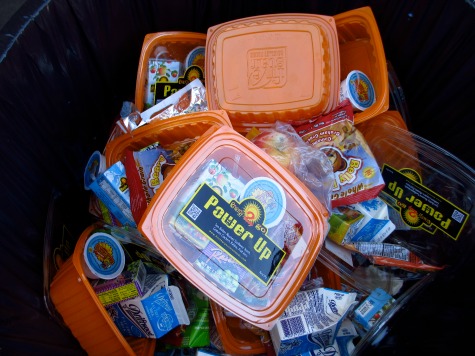DALLAS, Texas — No more pickles, no more popcorn is what the Lubbock Avalanche-Journal reported as among snacks now considered contraband in the Lubbock Independent School District (ISD) for K-12 campus fundraisers held during school hours. Favorite kid munchies have been replaced by 45 approved federally authorized goodies. The changes were approved by Lubbock’s Board of Trustees and all comply with USDA policies.
Actually, the district didn’t have a choice. Lubbock ISD, like every school district in the state and the country that signed onto the National School Lunch Program and School Breakfast Program for the 2014-15 school year, must comply to participate in this federal program that’s part of the USDA’s Community Eligibility Provision Program and the Healthy Hunger-Free Act of 2010, which set “limits on calories, fats, sugar and sodium” encouraging the “consumption of dairy, whole grains, protein, fruits and vegetables” and apply to “any school that participates in the National School Lunch Program,” according to Smart Snacks in School.
The National Food Lunch Program, championed by First Lady Michelle Obama, has been harshly criticized for its minute and tasteless meal portions and that’s resulted $4 million in trashed food and mandatory snacks each day.
In March 2014, the USDA issued a letter announcing enforcement guidelines effective as of July 1, 2014 that made it clear that the “USDA’s Office of the General Counsel has confirmed that USDA is prohibited by Federal law from waiving these regulations and is also prohibited from authorizing State agencies to do so.” So kids, say goodbye to favorite fundraiser sweet treats, replaced by government stamped smart snacks.
Lubbock ISD’s school superintendent Berhl Robertson ,Jr. verified that these federal regulations have to be incorporated in to local policies, according to the Avalanche-Journal. This affects all a la carte cafeteria sales, schools stores, snack bars, vending machines, and fundraisers.
Examples of new USDA smart snacks are fruits and vegetables (dried, freeze-dried, canned, fresh); whole-grain based chips; select whole-grain based snack bars; whole-grain crackers; and nuts and seeds. Beverages must be water, milk and almond milk substitute, 100% fruit juice, fruit juice diluted with water or carbonation, and flavored waters without added sweeteners. Smart Snacks in Schools lists criteria and examples of acceptable products that restrict caloric, sodium, sugar and fat content.
The Alliance Product Calculator for Smart Snacks is an online interactive tool to plug in snack data to check if it fits within USDA guidelines. In manystates, there are loopholes, according to a Pew Charitable Trust Q&A. The standards apply to all foods sold before, during, or up to 30 minutes after the school day.
Most afterschool food fundraisers, especially during the elementary school years are PTA or similar Parent-Teacher organization driven and happen immediately when school lets out in the afternoon to capture the largest audience before buses and parents take children home. At the 30 minute mark, it’s pretty desolate on campus.
On the other hand, Pew says that these rules do not apply to evening or weekend activities such as football games or band concerts. Schools or districts could choose to apply the standards to all after-school activities, but that is not required by USDA.
They also explain that the rule covers “foods and beverages that are usually available to students: those in vending machines, snack bars, and school stores or sold a la carte. If parents, teachers, and students want some occasional departures from the standards, state and local leaders have the option ofallowing that.
Also according to Pew, many schools make just as much money, if not more, with nonfood fundraisers. Examples of these kinds of fundraisers are gift wrapping paper sales or school spirit wear.
These rules apply to 100,000-plus US public schools that accept assistance from the National School Lunch Program.
According to the Texas Department of Agriculture, Big Education feeds more than 3 million Texas K-12 students and residential child care institutions.Currently, there are approximately 5.1 million students enrolled in Texas public schools.
Interestingly, the School Nutrition Association lists smart snacks state agency fundraising exemptions per state. Texas shows that it has no fundraiser exemption policy for its National School Lunch Program Participating campuses. Thus, zero fundraisers are listed as eligible to opt-out of the federal regulations in Texas.
Some states, like Georgia, are pushing back. In July, the Georgia State Board of Education (SBOE) chair Helen Rice and State School Superintendent John Barge issued a statement that read: “Tough economic times have translated into fewer resources, and these fundraisers allow our schools to raise a considerable amount of money for very worthwhile education programs.”
The two also jointly stated, “While we are concerned about the obesity epidemic, limiting food and beverage fundraisers at schools and school-related events is not the solution to solving it.”
Back in Lubbock ISD, school board president Dan Pope said he thought Founding Fathers such as Thomas Jefferson were probably spinning in their graves at the federal government’s actions, the Avalance-Journal noted.
The 35 district schools affected by the new smart snack policies are Alderson, Hardwick, Roberts, Bayless, Harwell, Rush, Bean, Stewart, Hodges, Bowie, Wester, Jackson, Brown, McWhorter, Wheelock, Centennial, Maedgen, Williams, Wolffarth, Dupre, Overton, Joan Y. Ervin, Parsons, Wright, Guadalupe and Ramirez Charter elementary schools; Atkins, Cavazos, Mackenzie, O.L. Slaton and Smylie Wilson middle schools; Estacado High School; Matthews Alternative High School; Priority Intervention Academy; and Dunbar College Preparatory Academy.
Other Texas school districts that participate in the National School Lunch Program include Allen, Birdsville, Carrollton-Farmers Branch, Dallas, Denton,Duncanville, Grand Prairie, Lewisville, Mesquite, Northwest, and Richardson. This year, Carroll ISD opted out.
Follow Merrill Hope on Twitter @OutOfTheBoxMom.

COMMENTS
Please let us know if you're having issues with commenting.